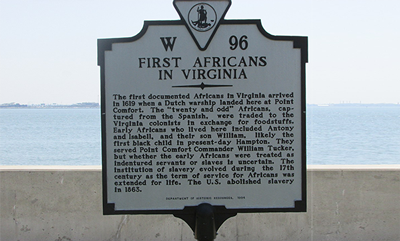SPH Joins 400 Years of Inequality National Movement.

Friday, October 18, 2019 marks 400 years since the arrival of the first group of African slaves who were sold into bondage in Jamestown, Va. This defining moment in American history established a system that codified racial inequality into law and spurred centuries of oppression, exploitation, and discrimination in the United States, still evident today in the health and economic disparities faced by African Americans.
 This fall, the School of Public Health will participate in 400 Years of Inequality, a national movement led by a diverse coalition of organizations and individuals who are calling on the public to observe this solemn anniversary, reflect on this history, and organize for a just and equitable society.
This fall, the School of Public Health will participate in 400 Years of Inequality, a national movement led by a diverse coalition of organizations and individuals who are calling on the public to observe this solemn anniversary, reflect on this history, and organize for a just and equitable society.
As a public health institution with a mission rooted in social justice, SPH is joining this national call to action. The commemoration will feature events throughout the semester, including a Dean’s Symposium, Dean’s Seminar, workshops, and class discussions.
The Activist Lab will play a central role in the programming, kicking off in September with a 400 Years of Inequality Timeline—an interactive project in collaboration with the College of Fine Arts and College of Arts and Sciences that will be displayed on the second floor in the East wing of the Talbot Building.
The visual display will chronicle 400 years of US history, including slavery and the Civil War, Jim Crow laws and the Civil Rights Act of 1965, and today’s health, economic, and educational disparities. SPH students, staff, and faculty are encouraged to share their personal histories or add a historical event that is meaningful to them.
“This timeline is a visual reminder that none of our public health challenges in 2019 are entirely new,” says Yvette Cozier, assistant dean of diversity and inclusion and associate professor of epidemiology, who was integral in planning the 400 Years of Inequality events at SPH. In her Social Epidemiology course, Cozier shares a similar historical timeline of race and health milestones in the US, including the landmark Medicare legislation which forced desegregation within the healthcare industry in 1965—a time, she notes, that was not that long ago.
“It was in my lifetime that hospitals had to be told to desegregate, so it was only less than 60 years ago that African Americans were not truly considered human,” she says. “That is profound, because it changes the whole landscape of how we view and address the problems and the disparities that exist today.”
Following the completion of the timeline in early October, the Activist Lab, in partnership with the BU Arts Initiative, will welcome Rhodessa Jones, theater artist and activist, as its artist-in-residence from October 15-19. Jones is the director of The MEDEA Project: Theater for Incarcerated Women and HIV Circle, a performance workshop designed to achieve personal and social transformation with incarcerated women and women living with HIV. She will conduct two storytelling workshops—one for faculty and staff on Tuesday, October 15, and one for students on Thursday, October 17—during which she will show how public health professionals can use storytelling to effect change among global populations. She will perform from The MEDEA Project on Wednesday, October 16.
Jones will also participate in the Dean’s Symposium and signature event of the commemoration, “400 Years of Inequality: Breaking the Cycle of Systemic Racism,” which will take place on the anniversary day, Friday, October 18, from 8 a.m. to 2:30 p.m. Cohosted with the Howard Thurman Center for Common Ground and the Museum of African American History, the symposium will feature two keynote addresses—one by Cornell William Brooks, professor of the practice of public leadership and social justice at Harvard Kennedy School, and another by Neera Tanden, president and CEO of the Center for American Progress. Other scholars and legal experts will also participate in panel discussions around race, housing, and education. Jones will expand on these themes and perform three-minute vignettes fromThe MEDEA Project and other pieces.
On November 6, the Dean’s Office and the Activist Lab will cohost the Dean’s Seminar “Black Reparations: The ARC of Justice” from 4:30 to 6 p.m. This seminar will explore the many perspectives that surround the controversial topic of reparations for the inequities that persist among African Americans today.
“I’m grateful for this opportunity to engage in the 400 Years of Inequality movement, because change and progress can’t happen without acknowledging the history of the systems our society stands upon,” says Emily Barbo, communications manager for the Activist Lab. “The fall semester is going to provide a lot of opportunities to examine our shared history, take stock in how we got where we are, and look forward with hope and energy to a healthier future.”
If you are interested in supporting the programming and activities run through The Activist Lab please consider making a gift to the Activist Lab Gift Fund.